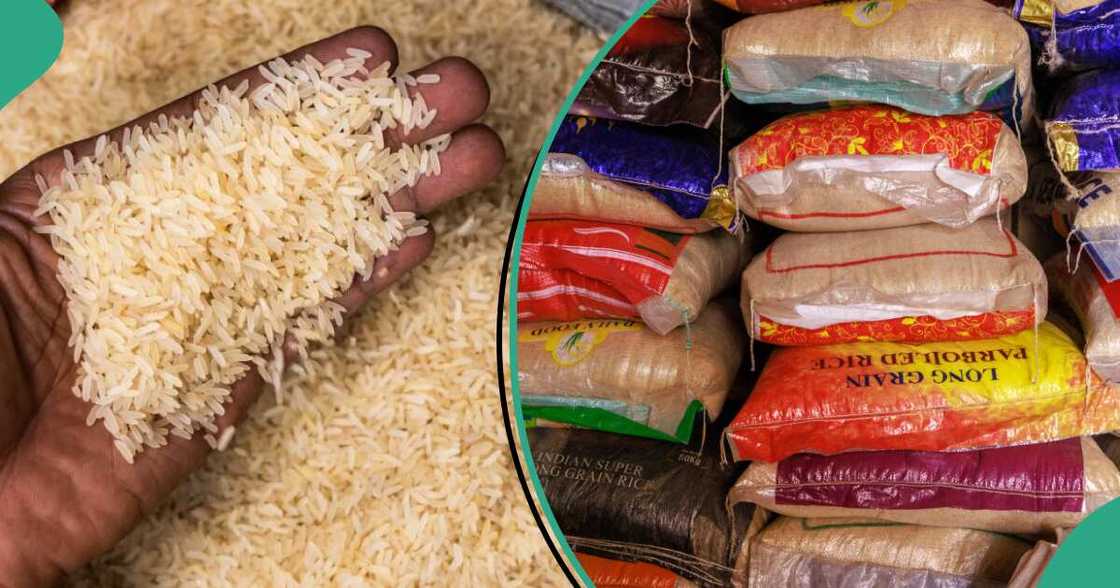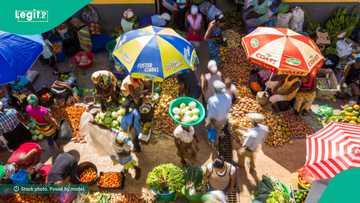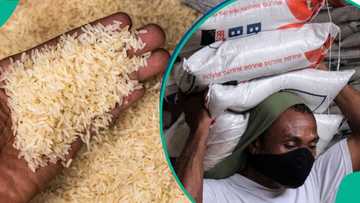Traders Lament As Demand For Rice Remains Low, Even As Prices Crash By N22,000 Again
- More food prices are dropping in Nigeria due to a combination of factors, ranging from government intervention to smuggling activities
- Reports show that the price of Nigeria's most popular staple food, rice, has crashed again by up to 28%
- The traders also confirmed this drop in price and commented on the demand for the product amid the price decline
Legit.ng journalist Ruth Okwumbu-Imafidon has over a decade of experience in business reporting across digital and mainstream media.
Nigerians can expect more reprieve in the coming weeks as market surveys show that prices of key food items are still going down.
Rice, touted to be one of the most commonly eaten foods in Nigeria, is becoming more affordable again, and reports show that the price has crashed by up to 28%.

Source: Getty Images
According to a report by S&P Global, a 50kg bag of rice now sells for about N58,000 in some parts of Nigeria, particularly the remote areas.
This is a major drop from the N80,000 it sold for in March, and the N65,000 it sold for a couple of weeks ago.
India’s removal of duties triggers price crash
According to the S&P Global report, West Africa’s markets have been flooded with parboiled rice following India’s removal of export duties on parboiled rice.
With the absence of duties on the commodity, the country is massively exporting the product into West Africa, with warehouses in the Republic of Benin reported to be filled.
Reports show an export of 2.11 million metric tonnes (MT) of parboiled rice from India to West Africa in Q4, 2024, nearly a 200% increase from the 720,000 MT exported in Q4, 2023.
Agricultural and Processed Food Products Export Development Authority reports that for the whole of 2024, India exported 5.35 million MT of parboiled rice to West Africa, a significant increase from 3.9 million MT in 2023.
Meanwhile, Nigeria's government is set to introduce the National Agribusiness Policy Mechanism (NAPM) to boost agricultural output, stabilise food prices, and stimulate economic growth.
Traders speak about the price drop
The traders have attributed this drop in price to a high influx of the commodity from neighbouring countries, including the Republic of Benin.
A Togolese rice trader confirmed to the Punch that the situation extended beyond Nigeria to almost all countries in West Africa.
As Nigeria continues to import rice from the Republic of Benin, both legally and illegally, the prices of local and imported rice remain on the decline.
The traders explained that local rice now sells between N58,000 to N60,000 for a 50kg bag, while Indian imported rice sells around N80,000 per bag.
For border communities like Ogun state, the price of the 50kg rice is below N50,000 now due to the influx from the Republic of Benin.

Read also
Dealers sell rice, beans, other food items at new rates as FG’s import waiver crashes prices
Demand remains low despite drop in price
Amid the price drop, demand has remained low, raising concerns about the decline in purchasing power of Nigerians and their inability to afford good meals.
A recent report suggested that Nigerians may be currently spending all their income on food, with some families now skipping meals to get by.

Source: UGC
The S&P Global report postulated that buyers may be waiting for prices to stabilise before making their purchases.
Traders also remain optimistic that demand will increase by the fourth quarter of the year when Christmas comes into focus.
Rice remains the most smuggled product in Nigeria
In related news, Legit.ng reported that rice was number one on the Nigeria Customs Service list of smuggled items.
For the first quarter of 2025, over 135,000 bags of rice valued at almost N1 billion were seized from multiple smuggling operations.
The service has intensified efforts to clamp down on rice smugglers and give local producers a fighting chance.
PAY ATTENTION: Сheck out news that is picked exactly for YOU ➡️ find the “Recommended for you” block on the home page and enjoy!
Proofreading by Nkem Ikeke, copy editor at Legit.ng.
Source: Legit.ng





